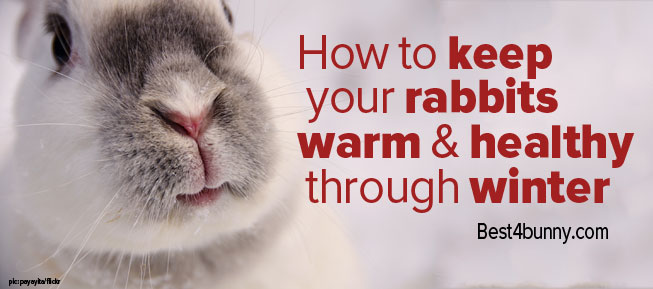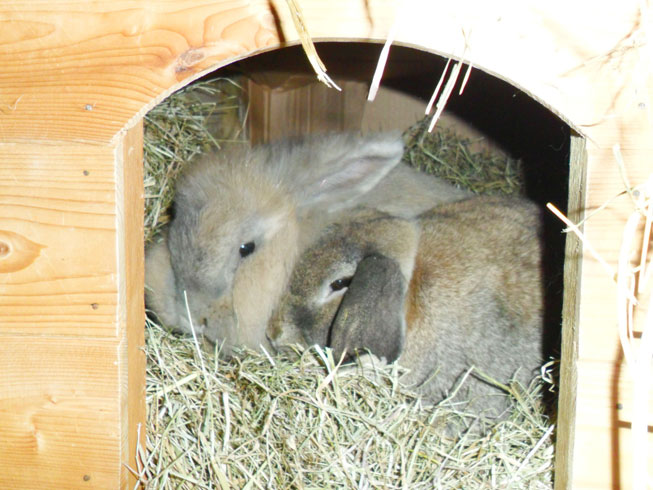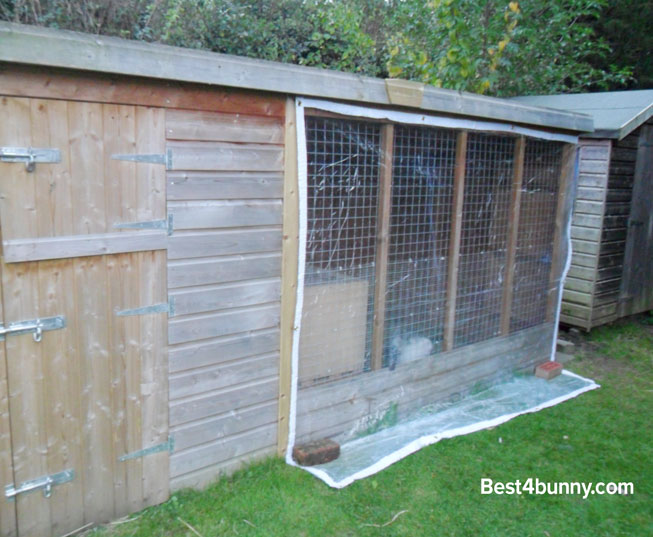
Helping your rabbits to keep warm & healthy through winter is essential. Here are some simple ways to keep your bunnies & their homes protected from the harsh winter weather…
##Keep them cosy with straw
Straw is warmer than hay, so stack your rabbit’s home full of nice dry straw. Remember to mix in lots of hay too, so they still have hay to eat at all times.
##Provide cosy bedroom areas
Nest boxes, hideouts or even cardboard boxes can all be provided as a cosy area for your bunnies to snuggle up in. If possible place their sleeping areas up off the floor and line the bottom of them with newspaper and cover well with lots of hay and straw.

## Use Pet carriers
Most pet carriers sit in a garage and are only used when visiting the vets. These carriers can make very cosy areas for your rabbits to snuggle up in. Place the carriers within their homes and fill with straw and hay.
##Insulate areas with cardboard
Use cardboard to insulate the inside walls of your rabbits enclosure. Use in areas like their sleeping compartment or their cosy rabbit hideouts and nest boxes.
##Cover up
Protect your rabbit’s accommodation from the cold wind, rain & snow by using clear market stall covers or tarpaulin or even clear shower curtains.
**Please note:** If you cover the rabbit enclosures at night with blankets or duvets, make sure they are not damp as this can draw the warm air out of the enclosures. Place water proof coverings over the top of them like tarpaulin.
**Please note:**When covering your rabbits accommodation – always make sure you leave air pockets.

##Keep out the draughts
*Place blankets over the top and sides of their hideouts, pet carriers & nest boxes, to help keep out any draughts.
*Bubble wrap stuffed in any small gaps in your rabbits accommodation will also help to keep draughts out. Just make sure your rabbit can’t reach it.
##Provide heat…
*Snuggle safes placed amongst the hay in your rabbit’s home are a great way to provide warmth for your bunnies, when it gets extremely cold outside.
*You could also put a hot water bottle inside a plastic container, like a food storage container and place this in amongst their hay. The plastic container will stop them nibbling the hot water bottle.
Or place more than one hot water bottle inside a larger storage container (like an under bed storage container) and place a blanket on top of this so they can lay on top and feel the heat from below.
##Watch their water
*Have extra drinking water bowls and bottles handy for your rabbit, so you can swap them over throughout the day, should the others become frozen.
*With water bottles, always check they can get the water. The water may not be frozen, but the metal spout & ball could be.
*Place thermal socks over their water bottles to help stop them freezing.
#Winter care tips
* Keep an eye on your rabbits weight. Some rabbits do need to be fed more in winter, mainly to help cope with the extra calories they burn to keep warm. Be careful not to overfeed your rabbits though.
* Always brush and health check your bunnies on a regular basis throughout the winter months.
* Always check your rabbit is eating and their behaviour is normal. Any changes could indicate your rabbit is ill. The earlier you spot any changes, the better. Always contact your vet if you are unsure about anything.
* Provide your rabbits with lots of toys and move items around in their accommodation to keep them entertained.
* Don’t just place their food in one place. Scatter it all around their home to encourage them to forage for food and to keep them busy.
* Check their bedding is never damp. Discard any damp hay or straw and replace with fresh, dry hay & straw.
* Exercise is important – even on the coldest days, you still need to provide lots of exercise time for your rabbits.
* Spend lots of quality time with your bunnies, even if it is dark outside. Invest in a LED light or head torch and go and spend some quality time with them.
* If the weather gets extremely cold or if your rabbit is sick, then consider bringing them into a garage or if you can, bring them into your house.
* Sudden changes in temperature can be harmful for rabbits. Once you bring them in, do not put them outside again until the weather has warmed up considerably
* Never put a rabbit outdoors for the first time during winter.



